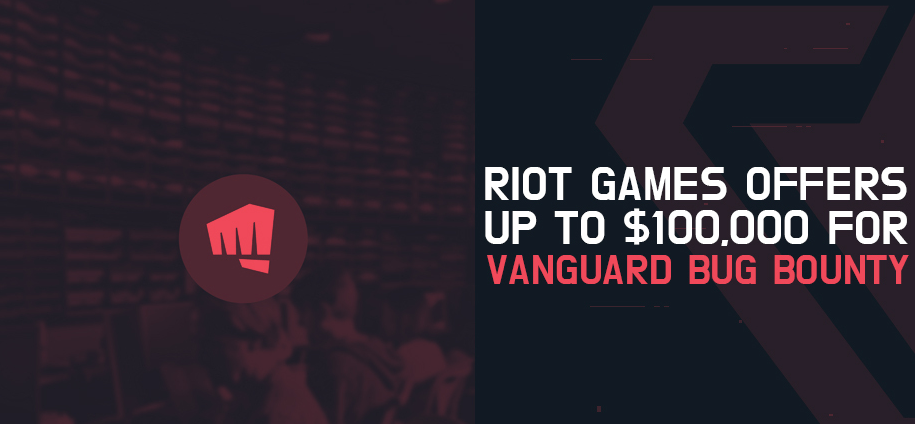Riot asks hackers to hack Vanguard for $100,000 reward

Riot Games, renowned for their multiplayer sensations League of Legends and Valorant, is taking an innovative approach to tackle cheaters and uphold a fair gaming environment. In their ongoing commitment to combatting unfair play, the company has introduced a compelling vulnerability bounty program. This program offers substantial rewards, with a maximum payout of $100,000, to skilled hackers who successfully identify vulnerabilities within Vanguard, Valorant’s cutting-edge anti-cheat system. By actively engaging the hacking community, Riot Games aims to fortify the security of their games and preserve the integrity of competitive gameplay. The vulnerability bounty program serves as a proactive measure to strengthen Vanguard’s defenses by leveraging the expertise of skilled hackers. This collaborative effort recognizes the potential benefits of tapping into the collective knowledge of the hacking community, turning them into allies in the fight against cheaters.
Through this initiative, Riot Games demonstrates their dedication to fair competition and player satisfaction. By offering significant financial incentives, they incentivize hackers to channel their skills towards constructive purposes, helping to identify and eliminate vulnerabilities that could be exploited by cheaters. The ultimate goal is to ensure a level playing field for all players, where skill and strategy prevail over unfair advantages. This forward-thinking approach highlights Riot Games’ commitment to continuous improvement and their proactive stance against cheating. By investing in the vulnerability bounty program, they not only prioritize fair play but also inspire confidence in their player base, reassuring them that every effort is being made to maintain a secure and enjoyable gaming experience.
Table of Contents
$100,000 Reward Offered by Riot for Hacking Vanguard
Riot’s anti-cheat solution, Vanguard, has generated significant discussion and controversy among players due to its perceived “aggressive policy” and the level of access it requires. Vanguard comes pre-installed on computers when users download Riot’s multiplayer shooter game, Valorant, and operates with elevated privileges, granting it direct access to a substantial portion of the user’s hardware in order to detect and prevent cheats. The comprehensive access Vanguard demands has raised concerns among players regarding potential privacy violations. While Riot has stated that Vanguard does not store or process any personal data beyond what is necessary for its anti-cheat system and what is already utilized by League of Legends’ anti-cheat system, some players remain skeptical. The fact that Vanguard runs as soon as the computer boots up has left many questioning the necessity of such broad and intrusive access. Riot Games defends Vanguard’s intrusive approach, emphasizing the importance of fair and cheat-free gaming environments. They argue that in order to maintain the integrity of their games and provide an enjoyable experience for all players, a robust anti-cheat system is necessary. Vanguard’s deep integration into the system allows it to effectively detect and prevent cheating, ensuring a level playing field. However, despite Riot’s justifications, privacy-conscious players remain hesitant to grant such extensive access to their systems. The concerns stem from the potential for abuse or unauthorized access to personal data, as well as the possibility of security vulnerabilities associated with a system-level program.
To address these concerns, Riot has taken steps to improve transparency and provide reassurance to players. They have published detailed technical information about Vanguard’s functionality, including how it operates and the data it collects. Additionally, Riot has implemented a “Trusted Mode” option that allows players to limit Vanguard’s access to specific functions, providing a compromise for those who prioritize privacy. Nevertheless, the debate surrounding Vanguard’s intrusive nature and privacy implications continues. Privacy-conscious players argue that alternative methods and less invasive approaches should be explored to strike a balance between anti-cheat effectiveness and user privacy. Suggestions include periodic scanning or running the anti-cheat system only during gameplay sessions rather than continuously. As the discussion unfolds, Riot Games faces the challenge of maintaining a secure and fair gaming environment while addressing the privacy concerns of their player base. Striking the right balance between comprehensive anti-cheat measures and respecting user privacy will be crucial in fostering trust and ensuring the continued success of their games. Riot’s Vanguard anti-cheat solution has sparked controversy due to its perceived intrusive nature and the extensive access it requires. While Riot emphasizes the necessity of such measures to combat cheating and maintain fair gameplay, privacy-conscious players have reservations about granting broad access to their systems. The ongoing debate highlights the importance of finding a middle ground that effectively addresses cheating concerns while respecting user privacy and fostering trust within the gaming community.
Riot calls it a compromise
While some players have expressed discontent over the mandatory inclusion of Vanguard, Riot Games argues that it is a necessary measure to ensure a competitive and fair gaming environment. They believe that the intrusive nature of the anti-cheat system will deter fewer players compared to the number of cheaters it prevents, ultimately providing a more transparent and enjoyable gaming experience for the majority. Riot Games continues to invest in improving Vanguard, not only for League of Legends but also for their other games. The introduction of the vulnerability bounty program is one of the ways they strive to address potential security issues promptly and maintain the trust of their player base. By incentivizing hackers to uncover vulnerabilities, Riot Games can proactively identify and resolve any weaknesses in Vanguard’s defenses. This collective effort serves as a proactive defense mechanism against cheaters and promotes fair play.
However, the acceptance of this privacy trade-off is a matter of personal perspective. While Riot Games has taken steps to address privacy concerns by ensuring that Vanguard only accesses the necessary data for its anti-cheat functionality and providing transparency about its operations, some players may still have reservations about granting such extensive access to their systems. The decision to participate in the gaming experience while using Vanguard ultimately rests with each individual player. In the ongoing battle against cheaters, Riot Games recognizes the importance of striking a delicate balance between maintaining a secure gaming environment and respecting player privacy. They are committed to addressing concerns, listening to player feedback, and implementing necessary changes to ensure both fair gameplay and data security. The evolution of Vanguard will likely continue as Riot Games navigates the ever-changing landscape of online gaming and adapts to the needs and expectations of their player community. While some players may voice opposition to the mandatory inclusion of Vanguard, Riot Games defends its necessity in preserving a competitive and fair gaming environment. The vulnerability bounty program demonstrates their commitment to proactive security measures and continuous improvement. Ultimately, the decision to embrace Vanguard and its privacy implications lies with individual players, as Riot Games strives to strike a balance between maintaining security and respecting player privacy.
Ethical hacking debate
Vanguard’s bug bounty program has reignited the longstanding debate surrounding the ethics of hacking and the effectiveness of software bug bounty initiatives. This program has generated diverse opinions within the gaming community and cybersecurity circles. While some individuals believe that bug bounty programs inadvertently reward attackers, others argue that these initiatives help legitimize hackers’ activities and ultimately enhance the overall security of the game. Bug bounty programs are designed to provide a controlled and safe environment for security researchers to identify and report vulnerabilities in software systems. The primary goal is to encourage responsible disclosure, ensuring that discovered vulnerabilities are used for legitimate research and fixes rather than for personal gain or malicious purposes. By offering financial incentives, companies can tap into the vast expertise of the hacker community, leveraging their skills to identify and address potential security threats before they can be exploited by malicious actors. Proponents of bug bounty programs argue that they act as a force multiplier in the fight against cyber threats. By creating channels for collaboration between security researchers and software developers, these initiatives facilitate the identification and resolution of vulnerabilities that may have otherwise gone unnoticed. This proactive approach allows companies to fortify their defenses, ultimately leading to more robust and secure software systems. However, critics of bug bounty programs raise valid concerns about the inherent risks and potential unintended consequences that these initiatives may bring.
One of the main concerns is the blurring of lines between ethical hacking and illegal activities. Some argue that by offering financial rewards for discovering vulnerabilities, there is a risk of attracting malicious actors who may have ulterior motives. This raises questions about the integrity and intentions of individuals participating in bug bounty programs. Another concern is the possibility of hackers discovering and publicizing vulnerabilities, only to exploit them after receiving payment. This highlights the importance of establishing clear guidelines and rules of engagement for bug bounty programs to ensure responsible disclosure and prevent the misuse of discovered vulnerabilities. To address these concerns and maintain the integrity of bug bounty programs, companies must carefully design and implement comprehensive frameworks. This includes defining the scope and boundaries of ethical hacking, establishing clear rules and protocols for vulnerability disclosure, and implementing robust verification and validation processes. Transparency and open communication are also crucial in bug bounty programs. Companies should maintain open lines of communication with participating researchers, providing regular updates on the status of reported vulnerabilities and acknowledging their contributions. This fosters a sense of trust and collaboration, encouraging researchers to continue engaging with the program and helping to build a stronger security ecosystem. Furthermore, companies must be prepared to act swiftly and diligently in addressing reported vulnerabilities. Timely response and remediation are vital to prevent potential exploits and maintain the trust of both the security research community and the broader user base.
Bug bounty programs represent an evolving approach to cybersecurity, harnessing the power of collective intelligence to enhance the security of software systems. While they are not without challenges and potential risks, when implemented thoughtfully and with clear guidelines, these programs can be effective in identifying and mitigating vulnerabilities. By fostering collaboration between security researchers and companies, bug bounty programs contribute to a more secure and resilient digital landscape.





